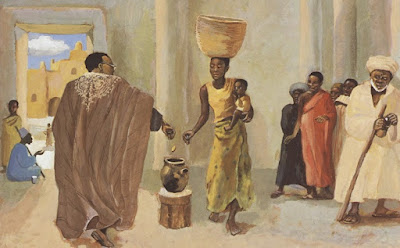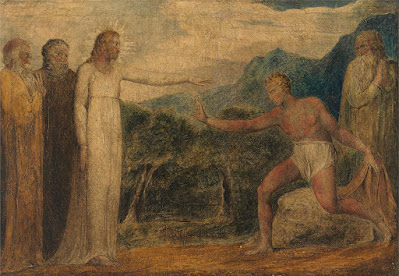We prayed in our opening prayer
for this feast of the Holy Family,
“that we may imitate themin practicing the virtues of family life.”
The family of Jesus, Mary, and Joseph
are offered to us as an ideal
that we are to strive to live up to
and a pattern for us to reproduce
in our own families.
So, how are you doing?
How well do you think
you measure up to this ideal?
If you don’t think you’re doing all that well,
it may be that we tend picture the Holy Family
as toddler Jesus playing happily at the feet of Mary
with his cousin John the Baptist,
always generously sharing his toys;
or as teenage Jesus and Joseph
working side-by-side in the carpenter’s shop,
Jesus always diligent
and Joseph quietly admiring Jesus’
preternatural skills with saw and lathe.
So when we look at our own toddler
bopping her brother in the head with a Tonka truck
or get angry with our teenager
when he seems so slow—not to mention sullen—
in finishing what really is a pretty simple task,
we may think that there is no way
that our own families will ever measure up
to the shining ideal of Jesus, Mary, and Joseph.
As children we will never match
Jesus’ amazing obedience and thoughtfulness;
as parents we will never have
Mary and Joseph’s endless patience and wisdom.
We will never achieve the holiness
of the Holy Family.
But what if we have misunderstood
what makes the Holy Family holy?
Part of the problem is that we confuse the ideal
that the Holy Family presents to us
with some nostalgic, and largely false, picture
of families from the past—
television images of children and parents
happily gathered around the family dinner table,
saying please and thank you
and talking about the exploits
and adventures of the day.
Or perhaps we think
of the carefully curated pictures
of familial joy and togetherness
that people used to include
in their Christmas cards
and now post year-round on social media.
Do we think of the holiness of the family
of Jesus, Mary, and Joseph as something like that:
a holiness that knows no struggle,
knows no sorrow or pain,
no confusion or misunderstanding?
If that is our picture,
then perhaps we need
to look more closely at the Scriptures.
We need to see Mary,
the frightened but faithful young girl,
quite unexpectedly pregnant,
who gives birth in a stable
and whose heart will be pierced
by the sword of sorrow.
We need to see Joseph,
the new father who struggles to provide
safety and stability for his family,
who must take them to a distant country
to avoid the threat of violence.
We need to see Jesus,
the baby born in a barn
who becomes the young man
who senses a call from God
that his parents struggle to grasp
and who follows a path
that frightens and worries them.
What makes the holy family holy?
It’s not their being some first-century version
of the twentieth-century television family
or the twenty-first-century Instagram family.
In our opening prayer,
we prayed that we might imitate them
not only in the virtues of family life,
but in “the bonds of charity.”
What makes the holy family holy is their love:
the love that makes Mary say “yes” to God,
the love that makes Joseph care for a child not his own,
the love that makes the eternal Son of God
empty himself and be born among us,
the love that makes him accept death,
even death on a cross,
the love that raises him from the grave.
It’s not their being some first-century version
of the twentieth-century television family
or the twenty-first-century Instagram family.
In our opening prayer,
we prayed that we might imitate them
not only in the virtues of family life,
but in “the bonds of charity.”
What makes the holy family holy is their love:
the love that makes Mary say “yes” to God,
the love that makes Joseph care for a child not his own,
the love that makes the eternal Son of God
empty himself and be born among us,
the love that makes him accept death,
even death on a cross,
the love that raises him from the grave.
This is the love that we hear behind Mary’s words:
“Son, why have you done this to us?
Your father and I have been looking for you
with great anxiety.”
This is the love that is present in Jesus’ reply:
“Why were you looking for me?
Did you not know that I must be in my Father’s house?”
This is the love that is present even amid
confusion and misunderstanding,
fear and frustration.
This is the love that makes Jesus who he is.
For while Jesus is who he is from all eternity
because he is the Word
who is born of the Father before all ages,
in a very real sense he also becomes who he is
by being born in time into a human family,
by advancing “in wisdom and age and favor
before God and man”
within the matrix of love
that is the holiness of the Holy Family.
“Son, why have you done this to us?
Your father and I have been looking for you
with great anxiety.”
This is the love that is present in Jesus’ reply:
“Why were you looking for me?
Did you not know that I must be in my Father’s house?”
This is the love that is present even amid
confusion and misunderstanding,
fear and frustration.
This is the love that makes Jesus who he is.
For while Jesus is who he is from all eternity
because he is the Word
who is born of the Father before all ages,
in a very real sense he also becomes who he is
by being born in time into a human family,
by advancing “in wisdom and age and favor
before God and man”
within the matrix of love
that is the holiness of the Holy Family.
But what of our families?
What of our families that struggle, not simply
to live up to a television or Instagram ideal,
but sometimes even to love at all?
What of our families,
where love at times cannot make itself felt
or cannot forgive the harms
that we have inflicted on one another?
Even then, we can look to the Holy Family.
The Holy family can teach us that love
is not the exclusive property
of mythical perfect families.
The Holy Family can teach us
that love can be present
even amid anxiety and confusion;
that we can keep loving people
even when we don’t understand them,
or can’t protect and provide for them
in the way that we would wish.
But above all,
the Holy Family can teach us
that there is a reservoir of love
upon which we can draw
when human love runs dry,
a perfect divine love that can heal
the imperfections of our human love:
“See what love the Father has bestowed on us
that we may be called the children of God.
And so we are.”
This is the love that forgives love’s failures,
that sustains us when the harms we cause
obscure the love we feel.
This is the love that makes us by grace
what Christ is by nature,
children of God,
treasured by God from all eternity.
What of our families that struggle, not simply
to live up to a television or Instagram ideal,
but sometimes even to love at all?
What of our families,
where love at times cannot make itself felt
or cannot forgive the harms
that we have inflicted on one another?
Even then, we can look to the Holy Family.
The Holy family can teach us that love
is not the exclusive property
of mythical perfect families.
The Holy Family can teach us
that love can be present
even amid anxiety and confusion;
that we can keep loving people
even when we don’t understand them,
or can’t protect and provide for them
in the way that we would wish.
But above all,
the Holy Family can teach us
that there is a reservoir of love
upon which we can draw
when human love runs dry,
a perfect divine love that can heal
the imperfections of our human love:
“See what love the Father has bestowed on us
that we may be called the children of God.
And so we are.”
This is the love that forgives love’s failures,
that sustains us when the harms we cause
obscure the love we feel.
This is the love that makes us by grace
what Christ is by nature,
children of God,
treasured by God from all eternity.
May we know such love
in these days of Christmas,
may we know it in our hearts,
in our families,
and in our world.
And may God have mercy on us all.
in these days of Christmas,
may we know it in our hearts,
in our families,
and in our world.
And may God have mercy on us all.













